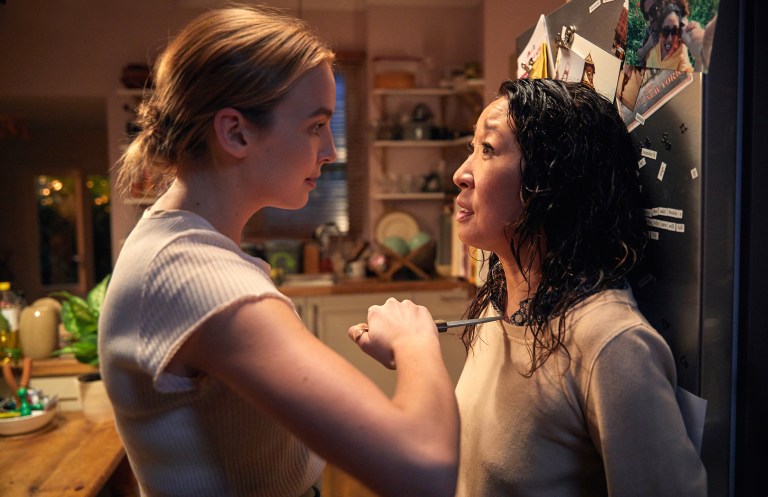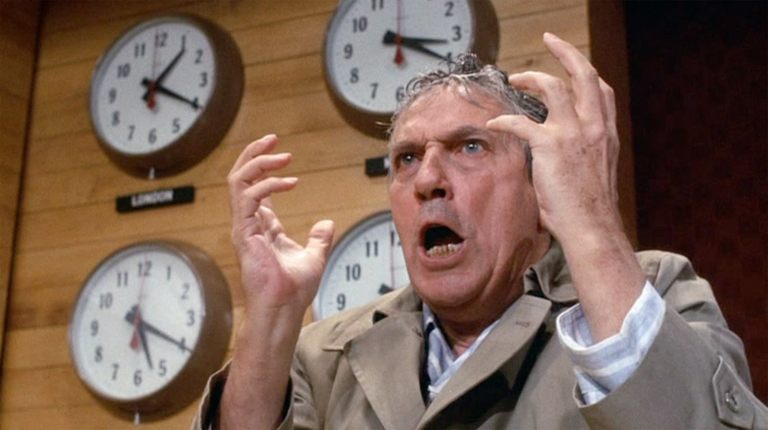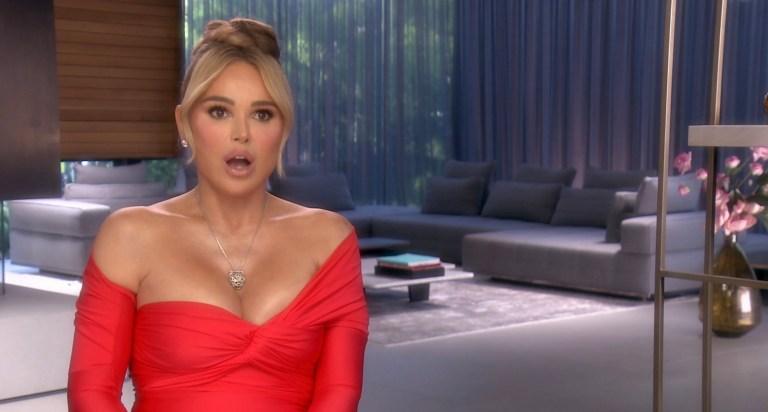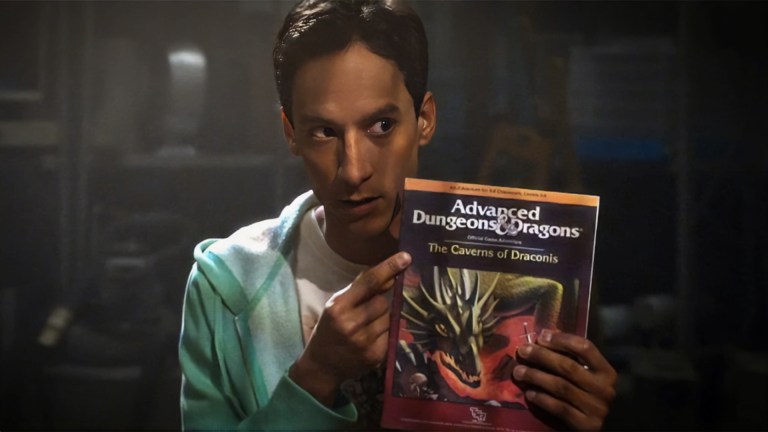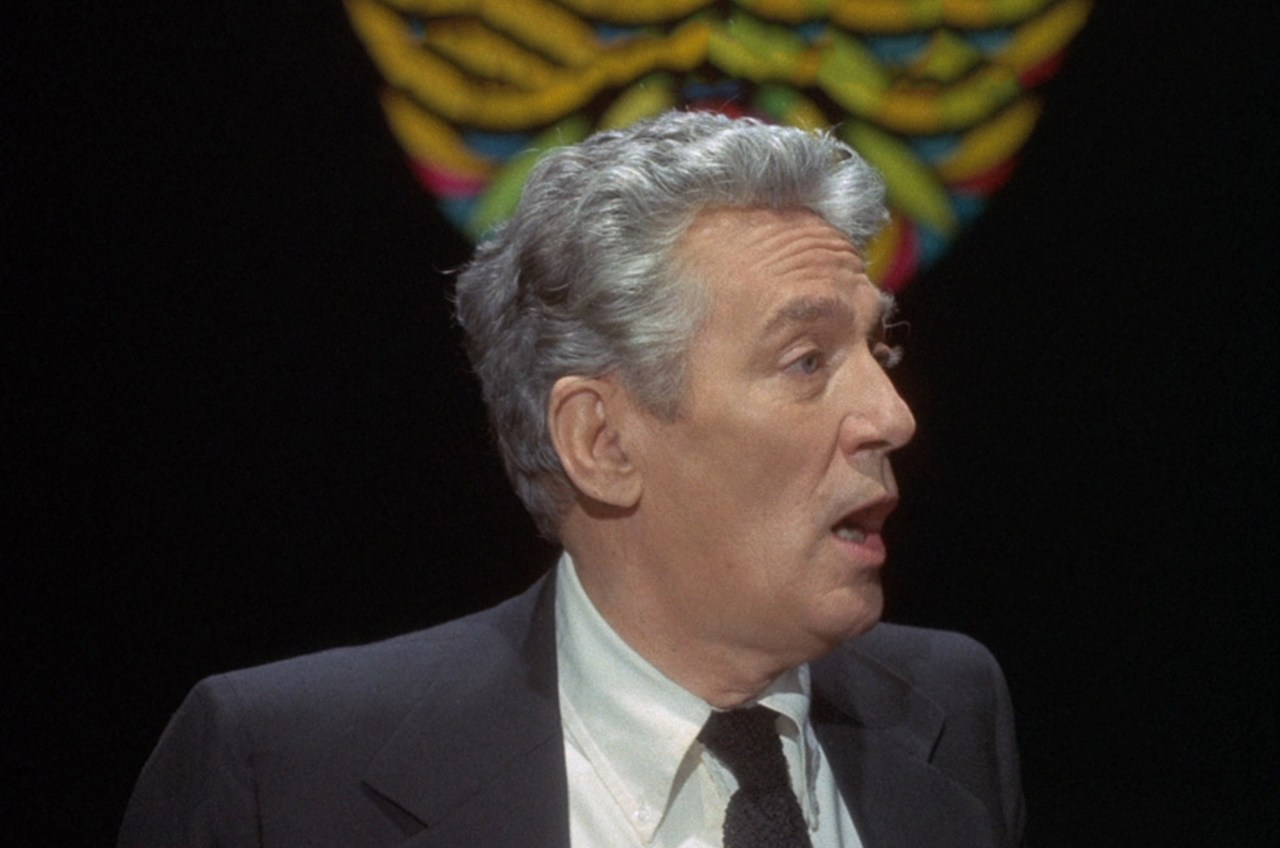
‘Network’ Or How TV Kills Everything
All I know is first you’ve got to get mad. You’ve got to say, “I’m a human being goddammit. My life has value.” So I want you to get up now. I want you to get out of your chairs and go to the window. Right now. I want you to go to the window,…
It might have lost the Oscar for Best Picture to Rocky, but Network (1976) is arguably the most prophetic and relevant studio film of the last 50 years. Written by Paddy Chayevsky and directed by Sidney Lumet, it’s a scathing assault on the television industry and how the pursuit of ratings leads to exploitation, insanity, the loss of self, and ultimately to a televised assassination orchestrated by a network. When it first came out, the film was billed as a slightly far-fetched satire, but having watched it again recently, I found it uncomfortably un-satirical and not that far-fetched. Though thankfully, I’m glad to report that we’ve yet to uncover any assassination plots orchestrated by a TV network. Not yet, anyway.
Of course, when most people think of Network, they usually only remember the character of Howard Beale (played by Peter Finch in his Oscar-winning role), the crazy TV news anchorman who during an on-air rant delivers one of the most famous lines in movie history: “I’m mad as hell and I’m not going to take this anymore.” The line has become more than just a movie quote; even in 2010, it continues to remain a succinct and powerful expression of anti-establishment outrage. You only have to listen to Glenn Beck, Tea Party protestors, or critics of Wall Street’s current excesses to hear its echoes.
However, Network isn’t the story of how an anchorman went crazy, spoke the truth, and triumphed over the establishment. It’s the story of how an anchorman went crazy, spoke too much truth, and ended up being destroyed by the institution of television.
In his classic book The Art of Dramatic Writing, Lajos Egri argues that every dramatic narrative requires a premise, and that the action of the narrative must rigorously prove that premise. Faith leads to victory (Star Wars). Jealousy leads to ruin (Othello). Love leads to happiness (My Big Fat Greek Wedding). Resilience leads to triumph (Die Hard).
The premise of Network is terrifyingly simple: television leads to death.
Allow me to elaborate.
(Note: if you’ve already seen the film, or you don’t mind huge spoilers, read on.)
Exhibit A: Howard Beale. Howard is certainly the most memorable character of the film, and the center around which its various storylines revolve. At the start of the film, Howard learns that he’s being fired from his job as the UBS-TV anchorman due to poor ratings. So, during one of his broadcasts, he announces that he’s going to kill himself in two weeks’ time live on the air. “That ought to get a hell of a rating, a fifty share easy.”
Needless to say, Howard’s announcement causes a media stir, not to mention hysteria within the network. However, Howard doesn’t end up committing suicide. Instead, he goes on to become “a mad prophet of the airwaves,” articulating the quiet (and not so quiet) desperation felt by millions of average, hardworking Americans:
Howard: I don’t have to tell you things are bad. Everybody knows things are bad. It’s a depression. Everybody’s out of work or scared of losing their job, the dollar buys a nickel’s worth, banks are going bust, shopkeepers keep a gun under the counter, punks are running wild in the streets, and there’s nobody anywhere who seems to know what to do, and there’s no end to it…I don’t want you to protest. I don’t want you to riot. I don’t want you to write to your congressman because I wouldn’t know what to tell you to write. I don’t know what to do about the depression and the inflation and the Russians and the crime in the street. All I know is that first you’ve got to get mad. You’ve got to say, “I’m a human being goddammit. My life has value.” So I want you to get up now. I want all of you to get up out of your chairs. I want you to get up right now and go to the window, open it and stick your head out and yell: “I’m as mad as hell, and I’m not going to take this anymore!”
Howard’s fiery populist message quickly transforms him into a voice of the people and a ratings sensation. He eventually gets his own show—which has more of the look and feel of a game show than a news program, complete with a live studio audience—and helps bring UBS out of fourth place to the number one slot. But after a fateful meeting with Arthur Jensen (Ned Beatty), head of the multinational corporation that owns UBS, Howard starts to change the tone of his rants, encouraging people not to “get mad,” but to accept the fact that they’re just cogs in the dehumanized, capitalist system:
Howard: What’s finished is the idea that this great country is dedicated to the freedom and flourishing of every individual in it. It’s the individual that’s finished. It’s every single, solitary human being who’s finished. It’s every single one of you out there who’s finished. Because this is no longer a nation of independent individuals. This is a nation of two hundred-odd million transistorized, deodorized, whiter-than-white, steel-belted bodies, totally unnecessary as human beings and as replaceable as piston rods…Well, the time has come to say, is dehumanization such a bad word? Because good or bad, that’s what’s so.”
While this all might be true, it’s a pretty depressing message, and Howard’s ratings start to tank as a result. However, UBS is unable to cancel him; Jensen has taken a personal liking to Howard’s new pro-dehumanization message and insists that his show stay on, even if it loses money. So the network resorts to the “only” course of action it has left: to kill Howard Beale. Howard, who had intended to blow his brains out live on the air at the film’s beginning, is gunned down live on the air at the film’s conclusion. The irony of Howard’s fate comes full circle. Television ends up killing him after all.
Exhibit B: Diana Christensen (Faye Dunaway). The ambitious, neurotic, ratings-obsessed director of original programming at UBS. She’s the one who takes command of the Howard Beale Show, sprucing it up with soothsayers and other variety acts, and turns it into the network’s #1 show. In the course of the film, she also has an affair with Howard’s best friend and old news boss Max Schumacher (played with understated brilliance by William Holden). But it eventually becomes clear—both to Max and the audience—that between love and ratings, Diana will always choose Mr. Nielson. Indeed, one of the funniest (and most painful) sequences in the film is a romantic montage in which Diana and Max walk on the beach, go to dinner, undress for sex, have sex, and finish having sex—and all the while, Diana can’t stop talking about work:
Diana: What’s really bugging me now is my daytime programming. NBC’s got a lock on daytime with their lousy game shows, and I’d like to bust them. I’m thinking of doing a homosexual soap opera—“The Dykes”—the heart-rending saga of a woman hopelessly in love with her husband’s mistress. What do you think?
Max ultimately ends his affair with Diana, telling her in a fairly brutal speech (see below) that television has made her incapable of having and expressing any real feelings. It’s clear that Max’s departure ends up killing the last spark of humanity left inside Diana, because in the very next scene after their breakup, she greenlights Howard Beale’s assassination: “I don’t see we have any option, Frank. Let’s kill the son of a bitch.”
Exhibit C: Edward G. Ruddy (William Prince). Ed Ruddy is Chairman of the Board at UBS. He’s been at the network for many years, and has seen it change considerably (and not entirely for the better) since it was acquired by Jensen’s multinational corporation. Along with Max, he’s one of the “good guys,” fighting to keep real journalism on the air despite corporate pressures and news division budget cuts. But it’s a fight he’s unable to see through to the end, since midway into the film, Ruddy dies of a heart attack.
Exhibit D: The Ecumenical Liberation Army. One of the movie’s subplots involves the Ecumenical Liberation Army (ELA), a band of ultra-left guerilla terrorists who film themselves robbing banks and committing other acts of violence; they’ve also managed to kidnap a wealthy heiress who assists them in their activities. (This is clearly a parody of the Symbionese Liberation Army, the group that kidnapped Patty Hearst.) Through various backchannels, Diana negotiates with the ELA to create “a reality show” that follows their activities. Diana doesn’t give a damn what political propaganda they spew on the show—just so long as there’s lots of bank robbery footage. This subplot contains some of the film’s most biting satire, as we witness the ELA’s leaders transform from Communist militants to shrewd, greedy capitalists once the show becomes a hit. During contract re-negotiations, here’s what Laureen Hobbs (who’s been serving as the go-between between UBS and the ELA) has to say about “distribution costs”:
Laureen: Don’t fuck with my distribution costs. I’m getting a lousy two-fifteen per segment, and I’m already deficiting twenty-five grand a week with Metro. I’m paying William Morris ten percent off the top….The Communist Party’s not going to see a nickel out of this goddamn show until we go into syndication.
It doesn’t matter if you’re an actress or a Communist radical, once you’re part of the great television machine, it’s all about the Benjamins. Whatever revolutionary ideals the ELA may have held at the beginning, misguided as they may have been, are as good as dead by the end of the movie. Indeed, Diana and her co-conspirators end up hiring two ELA members to assassinate Howard Beale. So much for the revolution.
Exhibit E: Max Schumacher. Contrary to what many people remember about the film, I’d argue that the hero of Network isn’t the “mad prophet” Howard Beale, but the “sane prophet” Max Schumacher, the only major character in the film who isn’t destroyed—literally or figuratively—by television. When we first meet him, Max is going through a professional and personal crisis. On the professional front, he’s distressed at what has happened to the TV news business in recent years. He’s seen his own news department transform from an autonomous division to one that increasingly takes its orders from Arthur Jensen’s corporation—specifically, from Jensen’s ruthless “golden boy” Frank Hackett (Robert Duvall). It’s Max who allows Howard’s first profanity-filled rant to go live on the air. When the powers-that-be call down to find out what’s happening—and why Max is letting Howard’s rant go out live to all their affiliates—Max flatly replies: “He’s saying life is bullshit and it is, so what are you screaming about?”
If professionally Max is feeling like an old relic, on the personal front, he’s feeling like a lion in winter. Which is what leads him to have an affair with Diana, a woman much younger than his wife of twenty-five years. For a brief moment, their relationship makes Max feel alive and drunk with passion again. But pretty soon, the buzz wears off, and he realizes that the relationship he thought would revitalize him is as empty and lifeless as the Howard Beale Show. Max also realizes that while he may’ve worked in television, Diana is a byproduct of television, and doesn’t know what it is to be truly human: “She learned life from Bugs Bunny. The only reality she knows is what comes over her TV set.”
Hackett ends up firing Max, thus forcing him into retirement and putting an abrupt end to his professional crisis. But the resolution to Max’s personal crisis comes when he ends his affair with Diana and goes back to his wife—effectively walking away from “television” once and for all in order to embrace “life.”
I’d like to make the case that the best speech in Network isn’t Howard Beale’s “mad as hell” speech, but rather the speech Max delivers to Diana when he ends their affair and leaves her for good. It is at once scathing, emotional, insightful, and an affirmation of the values of humanity against (as Max sees it) the dehumanizing values of television:
Max: It’s too late, Diana. There’s nothing left in you that I can live with. You’re one of Howard’s humanoids, and if I stay with you I’ll be destroyed! Like Howard Beale was destroyed. Like Laureen Hobbs was destroyed. Like everything you and the whole institution of television touch gets destroyed. You are television incarnate, Diana. Indifferent to suffering, insensitive to joy. All of life is reduced to the common rubble of humanity. War, murder, death are all the same to you as bottles of beer. The daily business of life is a corrupt comedy. You even shatter the sensations of time into split seconds and instant replays. You are madness, Diana, virulent madness, and everything you touch dies with you. Well, not me! Not while I can still feel pleasure and pain and love. Oh, Hell, Diana, it’s over with us. I’m not sure it ever really happened, but its over… It’s a happy ending, Diana. Wayward husband comes to his senses, returns to his wife with whom he has built a long and sustaining love. Heartless young woman left alone in her artic desolation. Music up with a swell. Final commercial. And here are a few scenes from next week’s show.
If there’s a more passionate and chilling indictment of television, I’ve yet to find it.
Also, it isn’t difficult to imagine that Max, in some ways, might be screenwriter Paddy Chayevsky’s surrogate. After all, Chayevsky had worked as a writer for television during its early years, and was most likely dismayed by what he’d seen happen to the industry. That is, how the quest for ratings had corrupted television to the point where it was possible to imagine a scenario in which a network might exploit a psychologically unstable news anchorman (and kill him on the air) all in the name of ratings.
Of course, that could never happen in reality. Could it?
That is the question Network leaves us to ponder—then and now:
Narrator (off-screen): This was the story of Howard Beale who was the network news anchorman on UBS-TV, the first known instance of a man being killed because he had lousy ratings.
Now, not everyone may agree with Network’s premise—I’ll admit, even I don’t agree with it entirely. (Not everything about television leads to death, in my humble opinion. Just certain TV shows.) However, I believe Network “argues” its premise quite powerfully and rigorously, and has as much prophetic relevance today as it did 34 years ago—perhaps more so. It predicted our increased obsession with reality TV; it predicted the trend of exploiting and co-opting people for the sake of ratings; it raised the important if uncomfortable question of “who owns the media?” and what impact that answer might have on the free press and American democracy; it even predicted the rise of future “mad prophets of the airwaves” like Glenn Beck. And as television faces its most challenging business model crisis in decades, the quest for ratings, the influence of corporate interests, and the impulse to turn everything into mass entertainment and must-see-TV, could potentially lead to some pretty monstrous results.
Just how monstrous? Only time will tell.
However, for all its biting outrage at the institution of television, Network still remains a satire. For the moment at least. Let’s hope the day never arrives when all of its prophesies come true. ![]()

